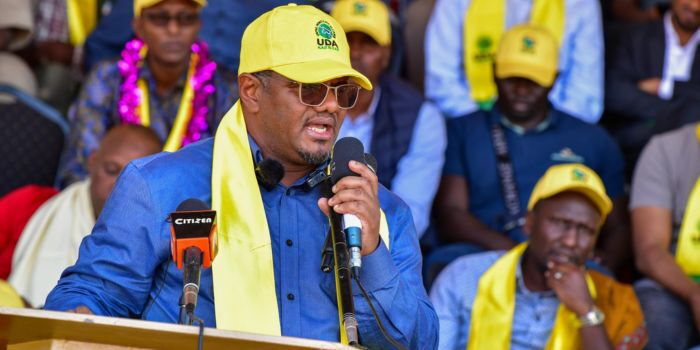On Sunday at Uhuru Park in Nairobi, during a solidarity event for Palestine organised by the Muslim community, Hassan Omar openly criticised the recent move to designate the Muslim Brotherhood as a terrorist organisation.
“I saw my brother gazette the Muslim organisation as a terrorist group. In my view, I do not share that position,” Omar said, referring to Interior Cabinet Secretary (CS) Murkomen’s recent decision. He further suggested that Kenya should consider gazetting Israel as a terrorist state instead.
Omar also urged a reassessment of Kenya’s foreign policy, advocating for stronger alignment with the Muslim world. “Let’s look for a way to influence Kenya’s policy on Israel,” he said. “We should ensure that we do not engage in any business with Israel. Kenya has more strategic interests in the Muslim world than it does in Israel.”
The controversial designation by CS Murkomen came through the 2025 Prevention of Terrorism Order, which listed the Muslim Brotherhood and Hizb-ur-Tahrir as terrorist entities. The gazette notice, dated September 19, states that the orders will remain in force indefinitely unless revoked by the CS or overturned by a court.
Founded in Egypt in 1928, the Muslim Brotherhood is a Sunni Islamist movement with branches worldwide. It combines religious revivalist ideology with social, educational, and political activism, advocating governance based on Islamic law. While the group maintains a public image of peaceful political action, it has faced accusations of promoting extremism and political opportunism and is outlawed in several countries.
Under Kenyan law, designation as a terrorist group involves a ban on all activities, freezing of assets, and criminalisation of any support, financial or ideological. The Prevention of Terrorism Act, 2012, empowers the Interior CS to classify groups engaged in terrorism-related activities, including planning or promoting violence for political, religious, or ideological purposes.
Omar’s remarks have reignited debate over Kenya’s counterterrorism policies and its diplomatic stance, highlighting tensions between national security measures and community sentiments.

